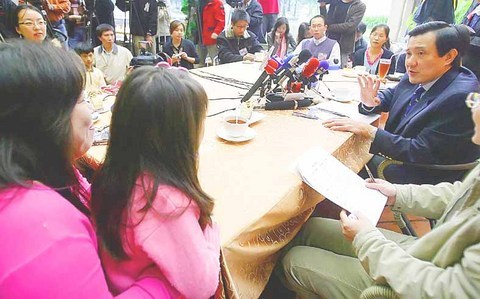Chinese Nationalist Party (KMT) Chairman Ma Ying-jeou (
Ma made the remarks during a tea party at 228 Memorial Park with eight citizens who won an online contest for a chance to meet with the chairman. He was responding to one participant's worries over the nation's slumping economy.
"Taiwan has the most advantageous position geographically, but the ban on direct flights and Chinese tourists has put Taiwan in an inferior position compared with many other Asian countries," Ma said.

PHOTO: WANG YI-SUNG, TAIPEI TIMES
Ma once again lauded the Mainland Affairs Council's (MAC) decision to allow Chinese tourists to visit Taiwan, and called on President Chen Shui-bian (陳水扁) "not to interfere with the Executive Yuan's decision this time."
Ma said that allowing Chinese tourists to visit could revitalize the local tourist and service industries and create more opportunity for cross-strait exchanges. He also suggested that the government should allow Chinese students to attend college in Taiwan.
Participant Shi Jing-chuan (
But Ma defended the meeting.
"What the KMT is doing now is to build a bridge between Taiwan and China. If the DPP government is willing to walk on the bridge, then there will be positive development," Ma responded.
Besides serious issues, participants at tea party also asked about how to keep one's hair black, how to teach kids about relationships and the secret to achieving a high "EQ" or emotional quotient. Housewife Fang Ching-mei (方靜鎂) praised Ma's "charming eyes" for "making me shy when looking at me" as the chairman was answering her question, and even tried to kiss Ma when having her picture taken with him.
In response to participants' curiosity and passion, Ma lauded their input on economic and political issues.
"They shared some deep thoughts and questions on some key issues. People who are in power should never ignore the voice of our citizens or treat them as idiots," he said.

Taiwan is to commence mass production of the Tien Kung (天弓, “Sky Bow”) III, IV and V missiles by the second quarter of this year if the legislature approves the government’s NT$1.25 trillion (US$39.78 billion) special defense budget, an official said yesterday. Commenting on condition of anonymity, a defense official with knowledge of the matter said that the advanced systems are expected to provide crucial capabilities against ballistic and cruise missiles for the proposed “T-Dome,” an advanced, multi-layered air defense network. The Tien Kung III is an air defense missile with a maximum interception altitude of 35km. The Tien Kung IV and V

The disruption of 941 flights in and out of Taiwan due to China’s large-scale military exercises was no accident, but rather the result of a “quasi-blockade” used to simulate creating the air and sea routes needed for an amphibious landing, a military expert said. The disruptions occurred on Tuesday and lasted about 10 hours as China conducted live-fire drills in the Taiwan Strait. The Civil Aviation Administration (CAA) said the exercises affected 857 international flights and 84 domestic flights, affecting more than 100,000 travelers. Su Tzu-yun (蘇紫雲), a research fellow at the government-sponsored Institute for National Defense and Security Research, said the air

A strong continental cold air mass is to bring pollutants to Taiwan from tomorrow, the Ministry of Environment said today, as it issued an “orange” air quality alert for most of the country. All of Taiwan except for Hualien and Taitung counties is to be under an “orange” air quality alert tomorrow, indicating air quality that is unhealthy for sensitive groups. In China, areas from Shandong to Shanghai have been enveloped in haze since Saturday, the ministry said in a news release. Yesterday, hourly concentrations of PM2.5 in these areas ranged from 65 to 160 micrograms per cubic meter (mg/m³), and pollutants were

Taiwan’s armed forces have established response protocols for a wide range of sudden contingencies, including the “Wan Chun Plan” to protect the head of state, the Ministry of Defense (MND) said today. After US President Donald Trump on Saturday launched a series of airstrikes in Venezuela and kidnapped Venezuelan President Nicolas Maduro, concerns have been raised as to whether China would launch a similar “decapitation strike” on Taiwan. The armed forces regularly coordinate with relevant agencies and practice drills to ensure preparedness for a wide range of scenarios, Vice Minister of National Defense Hsu Szu-chien (徐斯儉) told reporters before a